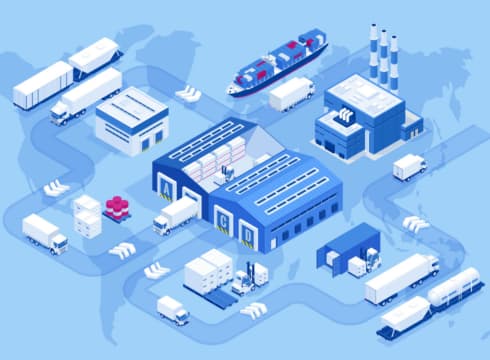The Unified Logistics Interface Platform (ULIP), a government initiative, is aimed at creating a transparent and competitive logistics ecosystem by providing a common platform for all logistics service providers
ULIP offers a standardised interface that provides real-time visibility into shipments, automates processes, and enables collaboration between all parties involved in the logistics chain
By assisting in decision-making, ULIP will facilitate structured planning while also saving money and effort for businesses when it comes to logistics
Inc42 Daily Brief
Stay Ahead With Daily News & Analysis on India’s Tech & Startup Economy
Digitalisation is revolutionising the way businesses operate within industrial value chains by using Internet of Things (IoT) technologies, predictive analytics and intensive data exchange. Application of technology on its own is not enough, as transitioning to an advanced business environment requires each industry to evolve, automate, and become more efficient to survive the competitive market. In order to achieve this, industries have rapidly started moving existing processes into digital technologies, from payments to online payments and from commerce to ecommerce.
Online shopping has become the norm for consumers worldwide, thanks to the declining cost and increasing availability of smartphones with high-speed connectivity. However, this growth has also brought many challenges for businesses, particularly in terms of logistics and shipping. The lack of a streamlined logistics infrastructure to efficiently handle the high volumes was one of the key challenges. This is where ULIP has played a crucial role in enabling EoDB (Ease of Doing Business) for the ecosystem.
Understanding ULIP
ULIP, or the Unified Logistics Interface Platform, is a government initiative under the PM Gati Shakti Scheme aimed at democratising the information available in various government systems for a transparent and competitive logistics ecosystem. It is a one-stop shop that enables businesses to access a variety of logistics services such as shipping, warehousing, and transportation. The platform offers a standardised interface that provides real-time visibility into shipments, automates processes, and enables collaboration between all parties involved in the logistics chain.
By providing a common platform for all logistics service providers, ULIP has created a level playing field for businesses of all sizes. This has encouraged competition and innovation in the ecommerce industry, leading to better services and lower costs for businesses. It has also made it easier for businesses to access logistics services, particularly in remote areas where logistics infrastructure is limited.
How Does It Translate For The Sellers In India?
For the sellers, ULIP provides an opportunity to streamline their operations and offer a better experience to their customers. One of the key benefits is increased transparency and visibility into shipments. The platform allows sellers to track their shipments in real-time, enabling them to plan their operations more efficiently. Knowing where their shipment is and how long it will take to reach the destination would allow sellers to communicate better with their customers. An improved customer experience enables sellers to build a community of loyal consumers.
Another key benefit is automation. The platform helps automate many of the manual processes involved in logistics, such as documentation and invoicing. The integration of automated processes would enable the sellers to save time and capital by decreasing the likelihood of human errors. Hence, sellers would be able to focus more on value-added services, such as improving their product offerings and marketing strategies.
To provide transparency and visibility into shipments, ULIP has a dedicated portal that makes the process of data requests simpler, smoother and faster. For example, it enables logistics providers to access shipment data in real-time, which helps them proactively address any issues that may arise during transit. ULIP also provides a single-window interface for all logistics-related services such as customs clearance, transportation, and warehousing. This simplifies the logistics process for Indian merchants and reduces the time and cost involved in managing logistics operations.
Why ULIP Is The Way Forward For India’s Logistic Sector
By assisting in decision-making regarding the best use of logistics modes, ULIP will facilitate structured planning while also saving money and effort for businesses. Through ULIP, the government aims to empower industry players with better sources of income generation while also eliminating monopolies and unequal advantages. In addition to improving the global logistics indices of India and the logistics cost percentage of GDP, achieving positive outcomes at the granular and individual levels will have a significant positive effect on the overall logistics sector of India.
ULIP has truly transformed the logistics industry by streamlining operations, improving efficiency, and providing a better experience for all players involved, including sellers, buyers, and logistics providers. By leveraging advanced technology and data analytics, the platform has created a more transparent and integrated supply chain ecosystem that benefits all stakeholders. With the aim of enabling ease of doing business for the ecommerce ecosystem, ULIP has the potential to power India’s $5 Mn GDP by 2025.
{{#name}}{{name}}{{/name}}{{^name}}-{{/name}}
{{#description}}{{description}}...{{/description}}{{^description}}-{{/description}}
Note: We at Inc42 take our ethics very seriously. More information about it can be found here.


